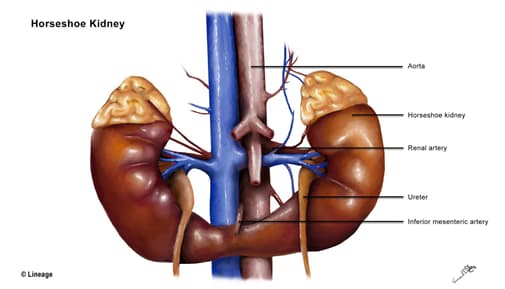
Snapshot

- A 2-year-old boy is referred by his pediatrician to a nephrologist for recurrent urinary tract infections. He was born at 39 weeks and appeared healthy at birth; however, he has developed significantly more urinary tract infections than expected for a child of his age. Physical exam reveals increased fullness in the abdomen and an MRI scan is obtained. Urine cultures are obtained and empirical antibiotics are started pending culture results.
Introduction
- Clinical definition
- congenital malformation of the renal system resulting in fused kidneys
- Epidemiology
- common malformation found in 1/400 live births
- twice as common in males
- Pathogenesis
- fusion of the lower poles of the kidneys (most common)
- arrest of the normal retroperitoneal ascent of the kidneys
- Associated conditions
- Turner syndrome
- trisomy 18 (Edwards syndrome)
- Prognosis
- typically very good
- most patients remain asymptomatic
Presentation
- Symptoms
- asymptomatic (most common)
- increased rate of urinary tract infections
- hydronephrosis due to
- ureteropelvic junction obstruction
- renal stones
- Physical exam
- abdominal fullness upon palpation
Imaging
- Kidney ultrasound
- indications
- initial evaluation of symptomatic patients
- indications
- Voiding cysturethrogram
- indications
- further evaluation of abnormal anatomy
- findings
- fusion of kidney poles trapped under the inferior mesenteric artery
- indications
- Intravenous pyelogram
- indications
- for evaluation of symptomatic kidney stones
- findings
- indications
- filling defect at the level of the obstruction
Differential
- Unilateral renal agenesis
- Posterior urethral valves
- Multicystic dysplastic kidney
- Duplex collecting system
Treatment
- Conservative
- no treatment for asymptomatic patients
- Medical
- antibiotics
- indication
- urinary tract infections
- outcomes
- indication
- antibiotics
- very good
Complications



